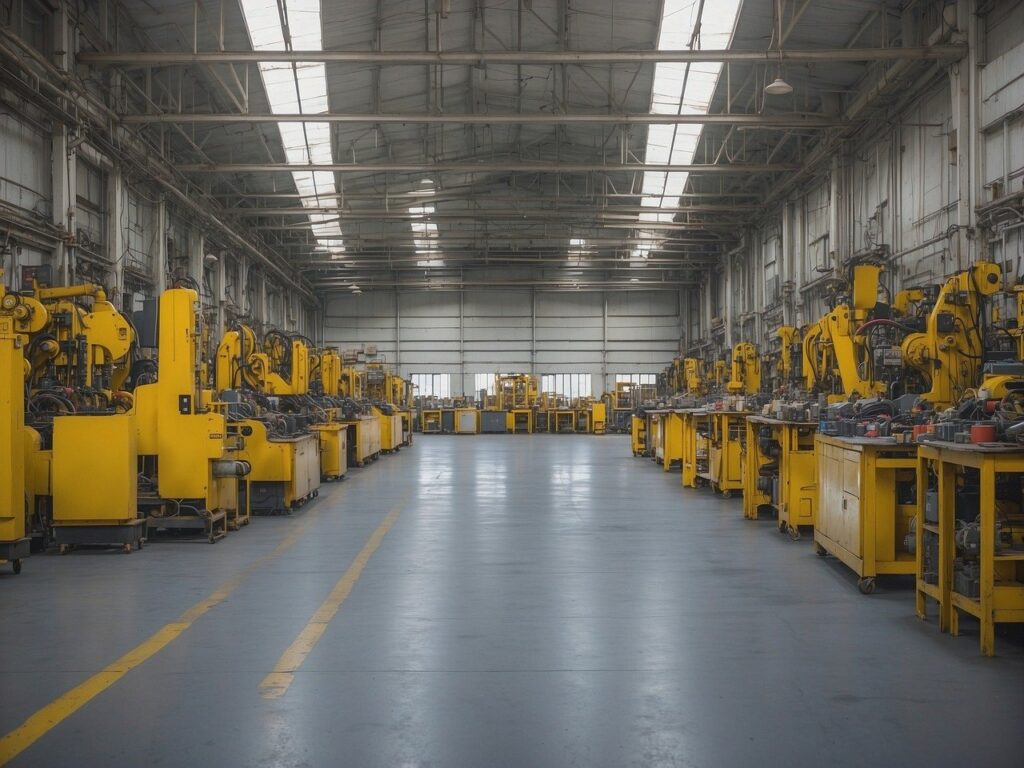DOE Announces $50M for Adapting Manufacturing in EV Supply Chain
The forward-thinking Biden-Harris Administration continues to advance its Investing in America agenda with a significant boost to the electric vehicle (EV) sector. On August 15, 2024, The U.S. Department of Energy (DOE), through the Office of Manufacturing and Energy Supply Chains (MESC), announced releasing $50 million in funding aimed at helping small- and medium-sized automotive suppliers in six states with substantial automotive workforces. This initiative is designed to assist these suppliers in adapting their manufacturing facilities for the growing EV supply chain, ensuring the preservation of good-paying, union jobs in traditional auto communities.
This funding is part of the broader $2 billion Domestic Automotive Manufacturing Conversion Grant program, which is funded by the historic Inflation Reduction Act, part of the most significant effort ever undertaken to combat climate change, both in the United States and globally. The program’s goal is to support the transition from traditional internal combustion engine vehicle manufacturing to electric vehicle production, safeguarding the livelihoods of workers in the automotive sector and maintaining these communities as key players in the evolving automotive industry.
The announcement also builds on recent actions by Vice President Harris to further support small- and medium-sized auto suppliers, underscoring the Biden-Harris Administration’s commitment to ensuring that the workers and manufacturers who have been the backbone of the American auto industry continue to thrive as the nation shifts towards an EV future.

President Biden and Vice President Harris have made it a priority to reinvest in and revitalize America’s manufacturing communities, ensuring that workers are empowered to benefit from the economic opportunities presented by the transition to clean energy. The latest announcement of $50 million in funding for small- and medium-sized automotive suppliers is a key step in this commitment. This investment will create and retain hundreds of well-paying, high-quality union jobs, providing crucial support to the American auto communities that have been the backbone of the U.S. economy for generations.
By focusing on adapting manufacturing facilities for the electric vehicle (EV) supply chain, this initiative not only preserves jobs but also positions these communities to thrive in the emerging clean energy economy. The funding underscores President Biden’s pledge to ensure that the future of the automobile industry is built in America by American union workers, reinforcing the nation’s role as a global manufacturing leader for years to come. This investment is a testament to the administration’s dedication to maintaining the U.S. as a manufacturing powerhouse, while also embracing the opportunities of a sustainable, clean energy future.

“Under President Biden and Vice President Harris’ leadership, America’s auto communities and the workforces they support finally have the tools they need to compete and thrive in the 21st century clean energy economy,” said U.S. Secretary of Energy Jennifer M. Granholm. “By helping states and manufacturers navigate the emerging EV manufacturing industry, today’s announcements will help ensure the workforces that defined America’s auto sector for the last 100 years will have the opportunity to shape the next 100 years.”
The announcement regarding state allocations is the result of a comprehensive process initiated by the Biden-Harris Administration to support the transition of automotive suppliers to the electric, hybrid, or fuel cell vehicle supply chains. Following an April 2024 Request for Information (RFI), the U.S. Department of Energy (DOE) sought input from various stakeholders, including local, state, federal, and non-government entities, on potential state-federal partnerships that could facilitate the distribution of federal funding to automotive suppliers.
To be eligible for the funding, grantees had to meet specific criteria: they must be a state, territory, or the District of Columbia with a workforce where at least 0.5% is employed in the automotive sector and qualify for a minimum of $4 million in grant funding. Based on these criteria, six states have been deemed eligible for funding:
- Michigan: $18,406,420.45
- Ohio: $9,373,236.32
- Indiana: $8,770,249.81
- Kentucky: $4,876,458.57
- Tennessee: $4,513,688.68
- Illinois: $4,059,946.17
These allocations are part of a broader effort to ensure that federal resources effectively reach the regions most vital to the U.S. automotive industry. By supporting these key states, the administration aims to preserve and create good-paying union jobs while enabling a smooth transition to a clean energy future for America’s automotive sector.
States have until October 15, 2024 at 5:00 pm ET to submit an application.

$50 million Small Supplier Grant Program Created at Michigan’s Request
The U.S. Department of Energy (DOE) created the $50 million Small Supplier Grant Program specifically for automotive suppliers transitioning to electric vehicles (EVs) in response to Michigan’s request. This program is designed to support small suppliers as they adapt to the rapidly changing demands of the EV market, ensuring they remain competitive and contribute to Michigan’s standing as an automotive powerhouse.
In May 2024, Vice President Kamala Harris and Michigan Lt. Governor Garlin Gilchrist II announced the new federal and state partnerships aimed at reinforcing Michigan’s leadership in the clean energy transition while ensuring that the state remains a pivotal player in the American auto industry.
Additionally, the DOE, in collaboration with the U.S. Department of Labor, announced in May it will designate Michigan as an EV Workforce Hub. This initiative, in partnership with the Michigan Department of Labor and Economic Opportunity (LEO), aims to provide Michigan workers with equitable access to high-quality training, education, and services. The goal is to create pathways to good-paying careers within their communities, ensuring that the benefits of the clean energy transition are widely shared among Michigan’s workforce. This collaboration underscores the commitment to maintaining Michigan’s position at the forefront of the automotive industry while preparing its workers for the jobs of the future.
“I commend the Biden-Harris administration for their partnership and significant investment in Michigan’s EV industry and clean energy initiatives,” said Governor Gretchen Whitmer. “This funding not only propels our state to the forefront of innovation but also ensures more Michiganders have access to quality jobs in these expanding sectors. This investment underscores our commitment to building a resilient economy that works for everyone and positions Michigan as a leader in the transition to a sustainable future.”
Expanding the Clean Energy Workforce and Enhancing Manufacturing Efficiency
In addition to the state allocations, the U.S. Department of Energy (DOE) is also announcing $1.5 million in funding for three teams under the expanded Industrial Training and Assessment Center (ITAC) program. These teams will be spearheaded by the Purdue University Manufacturing Extension Partnership, the Regents of the University of Michigan, and the Trustees of the University of Illinois.
The primary focus of these teams is to develop and refine a Small Supplier EV Transition Playbook. This playbook will be created in collaboration with Argonne National Laboratory and is designed to assist suppliers traditionally focused on internal combustion engines in transitioning their business models to electric vehicles (EVs) or related markets.
By providing targeted technical assistance and resources, the ITAC program aims to support smaller suppliers.
The Industrial Training and Assessment Center (ITAC) program is part of a broader effort to foster a clean energy and manufacturing workforce that reflects the diversity of America. This initiative aims to revitalize the manufacturing sector, positioning it to lead in the global clean energy transition. The ITAC program offers assessments to small- and medium-sized manufacturing firms, helping them identify opportunities for efficiency upgrades. These improvements not only save costs for manufacturers but also enhance the overall strength and competitiveness of the U.S. manufacturing base.
Additionally, the ITAC program supports President Biden’s Justice40 Initiative. This initiative aims to ensure that 40 percent of the benefits from federal investments in climate, clean energy, and clean transportation are directed towards disadvantaged communities that have historically faced underinvestment and are overburdened by pollution.
The Department of Energy’s Office of Manufacturing and Energy Supply Chains (MESC) will oversee the administration of both the Domestic Automotive Manufacturing Conversion Grants and the ITAC program. MESC’s mission is to drive investments in America’s energy future by supporting the re-shoring, skilling, and scaling of U.S. manufacturing across energy supply chains.
